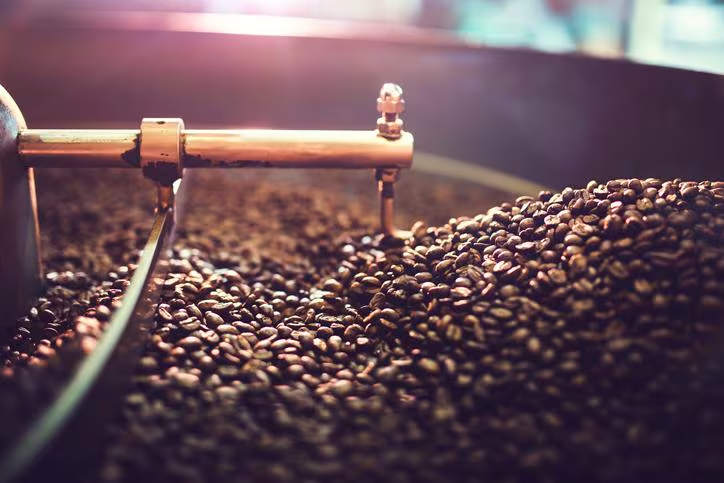Bold, stimulating, robust. No, we're not describing your favourite coffee – we're giving you an idea of what it feels like when you trade it.
- CFD Knowledge Hub
- CFD asset classes
- Introduction to trading coffee
Introduction to trading coffee

- 1.What are the coffee markets?
- 2.What factors affect coffee prices?
- 3.Ways to trade coffee
With more than 2.25 billion cups of coffee consumed in the world every day, it's widely believed coffee is the second most-traded commodity after oil.
Not too many other commodities can boast that kind of popularity, and it means that coffee price is the subject of major market speculation.
What are the coffee markets?
The two main types of coffee are Arabica and Robusta.
Arabica is considered the premium, more flavourful option of the two and is therefore more expensive, with beans selling for between US$2.60/kg and US$3/kg in recent times.
It makes up about 60 per cent to 70 per cent of all coffee production and mainly comes from Brazil and Colombia.
Robusta, on the other hand, can thrive in lower altitudes and hotter climates (as the name suggests), and has a more earthy and bitter taste than Arabica, as well as a higher caffeine content.
Robusta beans, which are mostly grown in Vietnam, have traded for between US$1.50 and US$2 in recent times and make up about 30% of the coffee bean market.
When it comes to actually consuming the beans, the United States makes up 18.5 per cent of total coffee imports, followed by Germany (11.2 per cent) and France (9.1 per cent).
Global production of coffee is measured in jute bags, which hold 60kg of coffee.
What factors affect coffee prices?
Trading in coffee comes with a degree of volatility, with key factors that influence supply and demand being:
Climate fluctuations: coffee grows on small trees, which means the crop is susceptible to adverse weather conditions such as frost, freeze and prolonged periods of dry weather. If supply decreases as a result of ruined crops, prices will increase.
Oil prices: the two leading exporters of coffee – Brazil and Vietnam – aren't exactly next door to the world's largest importers. If oil prices go up, so do transport costs, and that means coffee prices will rise too.
Geopolitics: coffee is mainly grown in developing nations, so any political instability can have an impact on global coffee prices.
Discretionary income: coffee is not a necessary part of a person's diet (no matter how much we may tell ourselves it is). High unemployment in the US and EU can reduce coffee consumption.
All of these factors combine to make a highly volatile commodity. Coffee reached an all-time high of 339.86 US cents in April 1977 due to one of the most damaging frosts ever to hit in Brazil.
Two years before, the price was just 45 US cents. Six months after the peak prices had halved to 149 US cents.
More recently in 2011 prices increased partly due to the biennial cycle of lower and higher output for Brazil's Arabica coffee plants, before dropping off again throughout 2012 due to a bumper crop season. It's another factor to consider if you're trading over longer periods.
Ways to trade coffee
There are a number of ways you can trade coffee using the CMC Markets CFD Trading platform:
Coffee futures: a standard futures contract is the most common way people trade coffee. This is where you agree to exchange a quantity of coffee with another party at a predetermined future date and price. If coffee doesn't get your blood pumping, perhaps futures will, as coffee futures can make wide swings within each trading day.
Coffee options: some people prefer options in this market because it can give you a bit more of a buffer against price volatility. With options, unlike futures, the holder doesn't have to buy or sell the asset if they don't wish to.
Coffee ETFs: an ETF is an investment fund that directly tracks the performance of the coffee market and can be bought and sold on a securities exchange. It can give an investor exposure to coffee futures without the need for a more complicated futures account.
Coffee company stocks: you can also invest in a coffee company, such as Starbucks (SBUX) and Dunkin' (DNKN). Meanwhile, Sara Lee, Procter & Gamble, Nestle and Kraft buy almost 50 per cent of all coffee produced worldwide.
Learn how to trade commodities.
It’s also worth bearing in mind that time zone differences mean world coffee market hours on the Intercontinental Exchange can be difficult to monitor without caffeine: the Robusta market runs from 6pm to 2.30am AEST, and the Arabica market from 6.15pm to 3.30am.